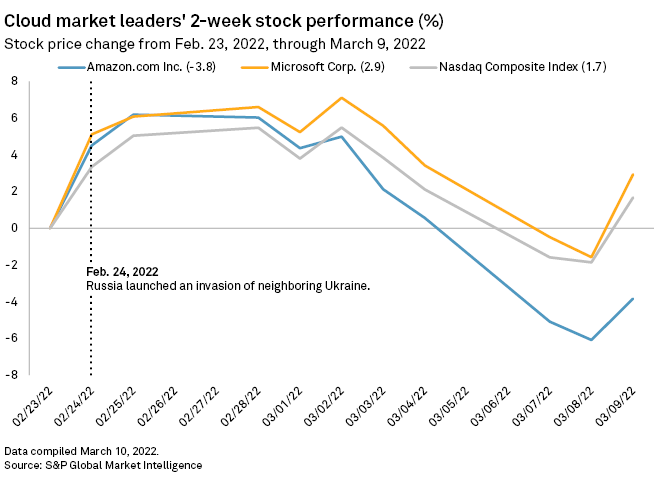Featured Topics
Featured Products
Events
S&P Global Offerings
Featured Topics
Featured Products
Events
S&P Global Offerings
Featured Topics
Featured Products
Events
S&P Global Offerings
Featured Topics
Featured Products
Events
Financial and Market intelligence
Fundamental & Alternative Datasets
Government & Defense
Professional Services
Banking & Capital Markets
Economy & Finance
Energy Transition & Sustainability
Technology & Innovation
Podcasts & Newsletters
Financial and Market intelligence
Fundamental & Alternative Datasets
Government & Defense
Professional Services
Banking & Capital Markets
Economy & Finance
Energy Transition & Sustainability
Technology & Innovation
Podcasts & Newsletters
10 Mar, 2022
By Anser Haider and Stefan Modrich
As Big Tech cloud providers weigh shutting down access to their digital infrastructure by Russian entities as part of a global backlash to the war in Ukraine, analysts predict the impact will be felt most by private enterprises in Russia.
Amazon.com Inc. and Microsoft Corp., the world's largest cloud providers, have already stopped accepting new contracts for cloud services in Russia. Their next move is likely to cut services from existing customers, analysts said, though the companies are taking time to weigh the repercussions.
"We believe it's a matter of when and not if AWS and Azure pull the plug on cloud services in Russia," said Wedbush Securities analyst Daniel Ives. "Street pressure is building, and investors want U.S. tech firms to leave Russia quickly."

When contacted by S&P Global Market Intelligence, spokespeople from both Microsoft and Amazon declined to comment on whether they planned to completely disable their products in Russia. In a March 8 statement, Amazon said AWS had "no data center, infrastructure, or offices in Russia, and we have a long-standing policy of not doing business with the Russian government."
The company's biggest AWS customers in Russia are companies headquartered outside of the country, according to a March 4 Amazon blog post.
Microsoft, in statements issued since the invasion of Ukraine, said it was working to support employees in the impacted regions and noted that it was "stopping many aspects of our business in Russia in compliance with governmental sanctions decisions."
Both Microsoft and Amazon also said they were working with Ukrainian entities to fight off cyberattacks emanating from Russia.
Stock prices for both companies fell in recent days. Shares of Amazon were down nearly 4% over the two weeks since the invasion began, while those of Microsoft were up about 3%.
Demand for cloud services has grown rapidly across the globe in recent years, with companies reporting double-digit cloud revenue growth as a pre-pandemic movement towards digitalization of data accelerated.

However, the amount of revenue generated from Russian entities is likely to be small, tech analysts said, while the regulatory and reputational risk for international companies that remain in Russia could be large.
"Big Tech companies have their backs against the wall as they face mounting pressure to halt all operations instead of only halting future sales," said Zeus Kerravala, founder and principal analyst at ZK Research. "If they don't take a clear stand and completely pull out of Russia, they risk irreparable damage to their business from boycotts."
Big Tech companies that continue operating in Russia could also see negative impacts in the labor market as they look to attract specialized talent in a tight job market.
"Nobody wants to work for evil Big Tech," said John Freeman, vice president of equity research at CFRA Research. "They want to work in an industry that's making a positive difference."
Ceasing cloud operations would not directly impact the Russian government, which does not host its operations on Western providers' platforms, said John Dinsdale, chief analyst and research director at Synergy Research Group. For customers that might be cut off, the impact would be much more devastating.
"Russia is not a particularly well-developed market, but for companies that have made a major transition to cloud-based operations, then reversing course will be tough," Dinsdale said. "Moving back to on-premise operations might necessitate ramping up investments in their own data centers and staff, which could be extremely difficult given the current environments."
In a research note to investors, Wedbush's Ives estimated that withdrawing from Russia would have a "1-to-2% revenue impact in a worst-case scenario" for cloud companies.
But cutting off access to services could bring other complications.
"If they proactively cut their services, they could run themselves afoul of contracts and that can get expensive, not just in terms of lost revenue," Freeman said. "Willfully reneging on a contract is not a great business practice if the customer has no direct connection or culpability in the war."
If entities in Russia are cut off from tech services, companies in other countries with autocratic regimes may also rethink their connections to Big Tech cloud providers, Freeman said.
In an open letter to U.S. President Joe Biden on March 10, a coalition of humanitarian groups asked the U.S. government to consider the implication of cutting off access to the internet and other technology services, including cloud, to ordinary Russians and Russian companies.
"We urge all actors considering steps that would limit internet access in the Russian Federation to carefully consider the full impact of such measures and their possible unintended consequences, and to act in a targeted, open, and strategic manner, consistent with international human rights principles of legality, legitimacy, necessity and proportionality," the letter said.
The coalition also asked the U.S. Treasury Department's Office of Foreign Assets Controls to issue a general license protecting the use of services, software and hardware for personal communications over the internet in Russia.
"Like so many, we are horrified by the Russian invasion of Ukraine. But in times of war as well as peace, it is crucial to ensure that people can share and access information," said Corynne McSherry, legal director of Electronic Frontier Foundation, one of the coalition partners, in an emailed statement to S&P Global Market Intelligence.